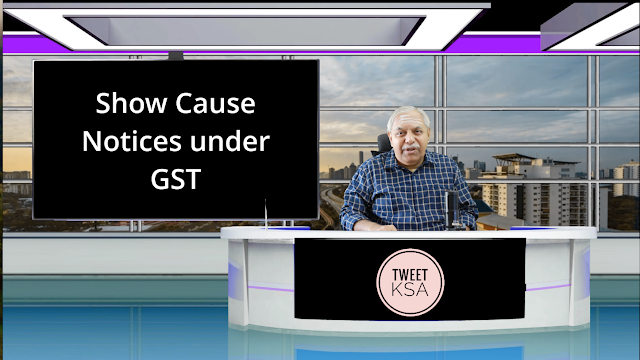Show Cause Notices under GST
1. Acknowledgment of Notice
• Notice Dates: There may be a difference between the date of the GST notice and the date of its receipt. Always note the date and time when acknowledging the receipt of the SCN.
• Avoidance is Not an Option: Ignoring an SCN is not advisable. Receipt and then a response or contestation is the correct approach. Not acknowledging an SCN is considered equivalent to having received it.
2. Responding to Time-Barred Notices
• Challenging Time-Barred SCNs: If the service of notice is beyond the permissible period, it can be contested with appropriate evidence.
• Extended Time-Period Rule: For SCNs issued after Section 73 timelines, it is essential to demonstrate that there was no concealment or suppression of facts, preventing the department from extending the SCN issuance period to maximum 54 months. The intention to evade tax is mandatory and this has to be proved by the Department.
3. Proactive Measures
• GST Payment before Notice: If there's an anticipation of a SCN and you believe GST is due, it's advisable to pay the tax before the issuance of the SCN. This saves from Penalty.
• Hearing Rights: When an SCN seeks to increase liability or reduce refunds, the assessee must be given an opportunity to be heard, a right that cannot be denied. Section 75(4) makes it clear that before passing any adverse order, hearing is must. Few High Courts have even held that personal hearing is must even when it’s not requested before passing adverse opinion.
4. Legal and Factual Challenges
• Validity of SCN: The legality and validity of an SCN can be challenged based on facts, timing, monetary limit or jurisdiction.
• Written Format: SCNs are always issued in writing. Verbal notices are not recognized under GST law.
• Mention of Amounts: An SCN must specify the demanded amount and any proposed penalty. An SCN without these details is invalid. Orders cannot be passed for amounts greater than those specified in Notice.
5. Specificity and Scope
• Period Specificity: SCNs should be specific to a particular period. Even if a demand is raised and paid, an SCN for a subsequent period is necessary.
• Scope Limitation: The department cannot adjudicate issues not mentioned in the SCN. The Order has to be within "four corners" of the notice.
6. Timely and Detailed Responses
• Stipulated Timeframe: Responses to SCNs should be within the time mentioned in the notice.
• Extension Requests: It's advisable to request an extension or adjournment if needed.
• Comprehensive Reply: Responses should address all points in the SCN and be supported by documentary evidence and relevant case laws. For Notice issued in DRC-01 the Form for Reply is DRC-06. For Notice in Part-A of DRC-01A, the reply has to be submitted in Part-B of DRC-01A.
7. Personal Hearing and Further Options
• Personal Hearing: Even after submitting a detailed response, seek a personal hearing to amend or modify your response during adjudication.
• Alternative Relief Measures: In cases of penalties, demands, or revocation of refunds, explore options for relief based on reasonable cause for non-compliance.
8. Right to Appeal and Professional Assistance
• Appealability: Orders issued against an SCN can be appealed.
• Professional Help: If personal representation is challenging, hiring a professional for drafting responses and representation is advisable.
9. Importance of Defence
• Foundation for the Future: Proper defence and argumentation in response to SCNs are crucial as they lay the groundwork for any future actions or appeals. As Show Cause notice is considered to be foundation of the case, the first reply is the foundation of the Litigation and defence.





No comments:
Post a Comment